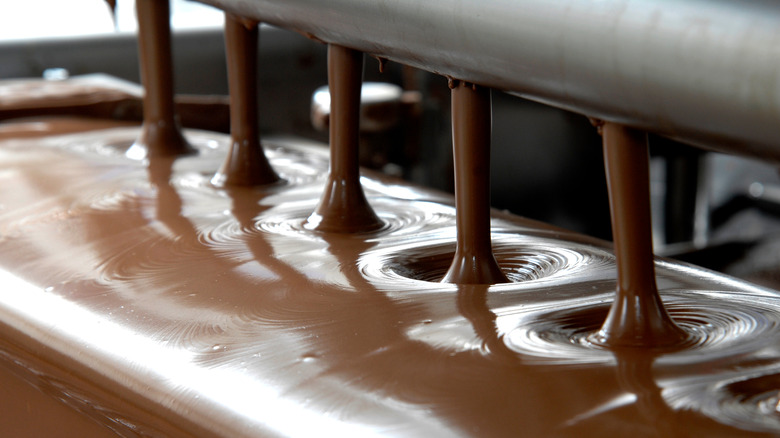Why Belgian Chocolate May Soon Become A Lot More Expensive
If a shutdown of the world's biggest chocolate factory sounds like a Wonka-esque emergency, then maybe it's time to start hoarding those velvety cacao-bean morsels. From bars to fudge, truffles, powders, hot cocoa, and semi-sweet baking chips, chocolate proudly parades through major holidays and everyday living across the globe. A production glitch in just one chocolate facility should be just a bump in the road — but what if that single wholesale business-to-business company was responsible for supplying the chocolate for at least 73 major chocolate confectioners worldwide?
That's exactly the case at a factory in the town of Wieze, Belgium. Swiss group Barry Callebaut runs what's considered the largest chocolate factory on earth, per the Guardian, and counts the likes of Hershey, Unilever, Nestlé, and Mondelēz as his customers. In its most recent fiscal year, his company racked up $7.9 billion in sales, according to United Press International (UPI), but when a catastrophe hit at the end of June 2022, the worldwide flow of chocolate suddenly slowed to a trickle — potentially affecting prices as well as production levels.
Here's what happened and what Barry Callebaut is doing to mitigate the damage.
Chocolate flow trickles
The news started rumbling as June 2022 came to a close: Swiss chocolate maker Barry Callebaut has halted all production at its Belgian chocolate factory in Wieze canceled all deliveries and urged all 73 clients who source chocolate from the facility to cease chocolate deliveries to their own customers, explains the Guardian. The culprit: a salmonella outbreak. Salmonella bacteria targets the intestinal tract and can cause diarrhea, fever, abdominal cramps, and other rare complications, notes WebMD.
Barry Callebaut discovered a salmonella-positive production lot on June 27 and tracked the source to lecithin, a component of all chocolate production, according to the corporate news release. In response, the company informed Belgian food authorities, froze production lines, placed holds on products manufactured since June 25, and began investigating root causes, risk factors, and mitigation processes.
How long this entire process will take, and whether Belgian chocolate will become more expensive as the saga continues, is yet to be seen. But the ripple effects are evident already, with chocolate giants Neuhaus, Guylian, Mondelēz, and The Belgian Chocolate Group freezing their own production lines due to contamination concerns, reveals UPI.
Barry Callebaut is not alone: Belgian chocolates took another recent hit when Ferrero, producer of Kinder chocolates, reported salmonella contamination at its Belgium facility. Ferrero is operating on a three-month trial basis as of June 17, per UPI, while Barry Callebaut states that chocolate production in its Belgian plant is suspended "until further notice."

